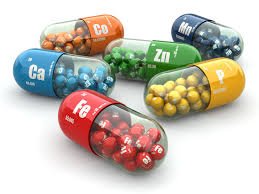The Importance of Vitamins and Minerals

The Importance of Vitamins and Minerals

In an ideal world, we would get all our vitamins and mineral supplements from the food we consume on a daily basis. However, many of us lead very busy and pressured lives. Some of us may not have sufficient time to put together a detailed and well thought out dietary plan that addresses all our needs. That is why Vitamin and mineral supplements have an important role to play as they are designed to complement and support our daily diet, to help ensure that our intake levels of essential micronutrients are maintained at an optimum level.
Why do we need vitamins and minerals?
Vitamins and minerals are collectively known as micronutrients. They are essential nutrients which our bodies need in small amounts to function properly. They are required for nearly all metabolic and developmental processes1-3. Each micronutrient supports specific functions in the body. For example, iron plays a key role in sending oxygen from the lungs to other tissues, vitamin A supports eyesight and a healthy skin, vitamin C protects our bodies against oxidative stress, while vitamin B is needed to help our bodies convert the food we eat into usable energy.
An insufficient daily intake of micronutrients may lead to a deficiency over time.
Before symptoms appear, ‘hidden hunger’ exists, meaning that while direct signs and symptoms of deficiency are not immediate evident, health problems may occur in the short or long term. A suboptimal intake of micronutrients may even contribute to the development of chronic diseases1,3-6. Therefore, an adequate supply of vitamins and minerals is therefore of key importance for our health.
What are the most important vitamins and minerals?
All essential vitamins and minerals are important. The word ‘essential’ means that our bodies cannot produce them on its own or cannot make them in sufficient amounts and so we need to get them via our food sources. . Our bodies are able to make small amounts of niacin (vitamin B3) from the amino acid tryptophan and vitamin D when our skin is exposed to sunlight. Interestingly, the bacteria in our gut are able to produce all eight forms of vitamin B and vitamin K. However, except for vitamin K, it is not yet known if gut bacteria are a significant source, as the bacteria produce these vitamins for their own use7,8.
The 13 vitamins are broadly speaking split into two groups: fat-soluble vitamins which include vitamin A, D, E, and K, and water-soluble vitamins which include the eight B-vitamins (thiamine, riboflavin, niacin, pantothenic acid, vitamin B-6, biotin, folate and vitamin B-12) and vitamin C.
The essential minerals and trace elements include calcium, chloride, chromium, copper, iodine, iron, magnesium, manganese, molybdenum, phosphorus, potassium, selenium, sodium and zinc.
Who can benefit from taking vitamin & mineral supplements?
Many people believe you can get all the nutrients you need with the help of a healthy, balanced diet. However, as previously explained in the introduction this is the ideal scenario. The pressures of modern life do not allow everyone to get adequate levels of micronutrients from food sources. This issue has been recognised by many countries which have encouraged the fortification of certain food
with riboflavin, folic acid, vitamin D and iodine to prevent deficiencies in some groups of people9. Eating patterns that are dominated by energy-dense, but nutrient-poor, foods – high in calories, but low in vitamins and minerals and other nutrients such as fibre and healthy fats – may negatively impact the quality of your diet and your nutritional status and are considered a main risk factor for bad health worldwide5,10,11. It comes as no surprise that inadequate levels of micronutrient intake has the potential to negatively impact general healthcare costs12,13, as supported by several studies looking at the correlation between healthcare costs and the consumption of micronutrients such as calcium, vitamin D, folic acid and iodine12,14-16.
Dietary supplements of essential vitamins and minerals are important when nutritional needs are not met through diet alone6. Dietary surveys have shown that the micronutrient intake in many European countries is suboptimal for various micronutrients in an important part of the population. These nutrients include vitamin A, C, D, B12, folic acid, iron, calcium, zinc, iodine and selenium17,18. Studies have also suggested that the number of people whose micronutrient intake is too low not only varies a lot from country to country but also within countries, and these differences depend on factors such as age, gender, socio-economic background , education and lifestyle11,17-21. Due to the fact that many people are not able to meet their daily recommended intake of vitamins and minerals, a daily multivitamin and mineral supplement would offer an insurance that those needs would be met4,11.
As micronutrient gaps might be larger in certain at-risk groups, in some cases specifics supplements are recommended to these sectors in the population. For example, women of reproductive age or those who are pregnant should ensure adequate intakes levels of folic acid, iron, calcium and iodine, while postmenopausal women and elderly men may benefit from a combination of calcium and vitamin D for bone health6.
It was recently estimated that thanks to calcium and vitamin D supplements being used by European adults over the age of 55 with osteoporosis, at least around € 2.8 billion could be saved a year as the frequency of bone fracture incidents would be reduced.15
There are certain groups in society for whom vitamins and mineral supplements are of great importance. For example, the elderly in particular are more susceptible to deficiencies of vitamin B1222,23, as well as other vitamins and minerals than younger adults.24,25. In addition, vegetarians and vegans may need supplementary amounts of vitamins and minerals, especially when they are following ongoing long term low-calorie diets. Finally, for those who do not have regular and sufficient skin exposure to the sunlight, taking a daily vitamin D tablet can be helpful. 26-29.
Healthy, active lifestyle; use vitamin & mineral supplements to complement your diet
A healthy, balanced diet is important in order to obtain all of the nutrients which are key to our health. However, few of us find it easy to live up to this ideal. The use of vitamin and mineral supplements can reduce dietary gaps and improve nutritional status without exceeding safe levels of intake. Ensuring adequate micronutrient intake is also of high relevance to the society at large, as it is a cost-effective approach to reduce healthcare costs12. There are many potential reasons to complement your diet with a vitamin & mineral supplement, depending on factors such as age, gender, dietary habits, and lifestyle. Herbalife can help complement your diet with vitamin & mineral supplements which meets your individual needs. This can help to safely counteract potential health problems caused by an unbalanced diet and at the same time obtain additional health benefits for an optimal you.
Formula 1 Healthy Meal Shake
The Formula 1 nutritional shake is a delicious, nutritious and convenient healthy meal replacement shake that provides a perfect balance of high quality protein, fibre, and key nutrients. Formula 1 is also an excellent multi-vitamin source, delivering more than 20 vitamins and minerals which help you achieve your daily Nutrient Reference Values (NRVs).
Formula 2 Vitamin & Mineral Complex Men
The Vitamin & mineral complex men is a comprehensive food supplement expertly developed for men to deliver 24 key nutrients. It contains essential vitamins and minerals in just the right amounts to target the daily health needs of men.
Formula 2 Vitamin & Mineral Complex Women
The Vitamin & mineral complex women is a comprehensive food supplement expertly developed for women to deliver 24 key nutrients. It contains essential vitamins and minerals in just the right amounts to nourish and care for the specific health needs of women.
